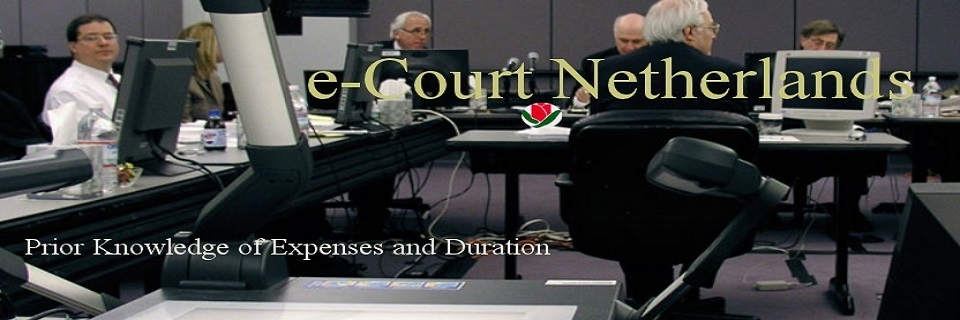With extrajudicial costs is meant that the 'winning' part will receive a compensatory amount ( whole or in part ) as payment for costs made prior to the e-Court procedure(s). Either party may prove these costs are conflict related and have indeed incurred as well that the party made attempts to settle the conflict between parties prior to going to seek litigation.
Costs incurred prior to the e-Court process

Empowering the Growth of International ADR: Cries for change
source : Michael Leathes

One recent exception was the ICCA Annual Conference in Singapore in June 2012, the theme of which was “International Arbitration – the coming of a new age?” The keynote speech was given by the then Attorney General of Singapore (now Chief Justice) Sundaresh Menon, a man with a distinguished career in international arbitration.
Mr Menon suggested that the “new age” of arbitration is, in fact, its golden age, implying that the field stood on the brink of decline, and urged arbitrators to “embark on a course of collective self-reflection…on what we as a community have done right, but more importantly, on what we could do better, and perhaps plant the seeds of change so that our industry will…continue to play a critical role in the global administration of commercial justice.”
Mr Menon highlighted how arbitration has suffered from growing complexity and “judicialisation” becoming more time consuming and costly, leading to a “growing frustration for users” and asked whether “these telltale signs of trouble signify the beginning of the end”. He saw an increasing disconnect between the satisfaction of the arbitration community with the revenues they earned compared to the “growing dissatisfaction with [the] unregulated industry” by users. He urged the field to head off declining credibility and confidence by “charting a new course” and design and subscribe to an international self-regulatory regime involving greater efficiency, transparency and accountability.
Mr Menon proposed that the self-regulatory framework governing arbitrators should cover initial entry requirements, a competency certification system and practice standards for the conduct of arbitrators and also of international arbitration counsel, including a uniform global set of ethical standards and rules of professional conduct backed up by a disciplinary process. He envisaged arbitral institutions being the functional equivalent of Bar Associations in this system, with a role in implementing the self-regulatory standards. He drew a distinction between injecting greater transparency in arbitrator conduct, and the substantive issues in dispute (which are confidential). He advanced the idea of an open-access database of information about arbitrators and their decisions under the auspices of a respected international body. He concluded that this would aid “…parties in their selection of, or even their approach towards, arbitrators in future cases, moving away from glorified and often self-promoting curriculum vitae, to serve as a repository of useful and independently audited information on an arbitrator’s past cases, reasoned decisions (if necessary redacted to protect… confidentiality), the instances where the arbitrator ruled or dissented in favor of his appointing party, as well as complaints and feedback from parties.”
A few months later, Professor Rogers proposed an International Arbitrator Information Project (IAIP) to help correct the “gumshoe clue-hunting approach currently employed to select international arbitrators” which is “severely outdated and unduly expensive in an era of information and technological efficiency”. Professor Rogers suggested that the IAIP would be a non-profit resource providing reliable, objective information about arbitrators, with each arbitrator having a dedicated space that in addition to biographical information would include links to publicly available arbitral awards and other data, including peer reviews. It would also include objective appraisals of arbitrators’ case management skills, and behavior as an arbitrator based on feedback from users and users’ counsel. She identified various legal and practical obstacles including confidentiality, how feedback would be edited responsibly and fairly, but said that these issues can be addressed.
A few additional relevant considerations:
IMI is the only body in the international ADR field in which several of the leading arbitration institutions (AAA, BCDR, ICC, JAMS, SIAC) are collaborating with the express intent of helping to raise professional standards and deliver greater transparency.
A collaboration arrangement was announced in March 2013 between IMI and the Corporate Counsel International Arbitration Group (CCIAG). This collaboration will enable the user share of voice in international ADR to be more heard more loudly and clearly.
A 2011 survey was recently published of the in-house dispute resolution counsel in 368 Fortune 1,000 US companies conducted by Cornell and Pepperdine Universities with CPR Institute as a follow-up to a 1997 survey conducted by Cornell. This survey looked for trends among corporate users since 1997, emerging ADR policies and practices, and u the drivers of those trends, policies and practices. There is much useful data in this survey for both arbitration and mediation. One of the most startling statistics is that there has been a significant decline in the use of arbitration in 8 out the 10 categories of dispute surveyed between 1997 and 2011.
An International Corporate Users ADR Survey was conducted by IMI between mid-January and mid-March 2013 among 76 corporate in-house dispute resolution counsel. The Survey raised a number of issues that earlier research by different organizations had not asked of corporate in-house dispute resolution counsel. The results are revealing. In summary:
1. Users want more information about both arbitrators and mediators including evidence that their competency has been independently assessed, they want them to belong to professional ADR organizations that are not service providers, and to subscribe to rigorous Codes of Practice in ADR that render them subject to disciplinary processes, as any other mainstream professionals. User demand for more information and higher professional standards in ADR is unequivocal.
An international institution is needed to address the global user demand, particularly in arbitration, conciliation and similar methods of resolving international commercial disputes. That institution should preferably not be a service provider.
Ideally it should be a new entity, without an historical footprint, established as a collaboration of the demand and supply sides of the arbitration field – similar to how IMI is set up successfully in the mediation field. It could be affiliated to IMI to share funding and overheads and secure an early momentum. Funding could be drawn from all those with an interest in greater access to information and higher quality in ADR – meaning: users, ADR provider organizations, law firms and individual ADR practitioners.
Some may feel that this could be achieved by an existing entity established at global level that does not provide ADR services. ICCA, a highly-regarded organization with a truly global reach and representation that does not administer arbitrations or act as an appointing authority, and has UN NGO Consultative Status on behalf of the arbitration field, seems to be the only realistic possibility. However, ICCA’s Statement of Purposes focuses its role on conferences, publications and thought leadership, not acting as the field’s professional institution and self-regulatory authority. Moreover, although ICCA’s 40+ strong Governing Board comprises distinguished arbitrators and conciliators, counsel and educators, it does not include any corporate users.
Easier and better, perhaps, to set up a brand new entity, with close ties to established and valuable existing institutions like ICCA and the world’s great and smaller ADR providers. That entity would need to focus its core mission on:
(1) setting and achieving the highest standards in arbitration and conciliation;
The Devil may lie in the detail, but this four-point mission is not difficult thing to implement. The specifics need to be beaten out jointly by practitioners and users as a collaborative effort. The supply side and the demand side should do it together.
2. Past experience with arbitrators and mediators is seen as vital to selection decisions – whether that experience is the user’s own, or that of their counsel, or of previous users of the neutrals under consideration in independently-prepared feedback summaries. A high proportion (76%) say they want access to the feedback of previous users of both arbitrators and mediators.
3. Arbitration providers are now expected by three quarters of in-house dispute resolution counsel to be proactively encouraging parties to mediate their disputes, and almost half go so far as to want Courts and Tribunals to make mediation a compulsory step in both litigation and arbitration.
(2) establishing a globally-applicable Code of Professional Practice linked to a disciplinary procedure credible to users;
(3) improving the quality and depth of information available about arbitration and conciliation, and in particular about arbitrators and conciliators;
(4) promoting what users will regard as more practical, efficient use of ADR processes.
-
TOPICS:
- ABOUT e-COURT
- home
- preliminary information
- introduction ( About us )
- benefits
- scope of legal areas
- directorate
- supervisory board
- advisory council
- originating partners
- e-Court & ADRpartners
- articles of operation
- privacy
- legal information
- in the news
- ( e-Court versus ADR )
- COSTS
- *** introduction
- *** membership
- *** court fee
- *** escrow
- *** hearings costs
- *** attestation costs
- *** EXTRA JUDICIAL COSTS
- *** legal counsel fees
- *** subsequent costs
- frequently answered questions
- OFFLINE NETWORKING
Endorsements ( 1/2000 + ):
- Patricia M. Swerhone
Waters and Associates, Barristers & Solicitors, Toronto - Kenneth J. Byrne
Immigration and Real Estate Lawyer at Benson Buffett, Newfoundland And Labrador - Justice Clark
Partner at Simmons Da Silva + Sinton LLP, Toronto - Stanley Potter
Owner, Stanley J. Potter, Barrister & Solicitor, Toronto - James A. Carr
Barrister and Solicitor at Carr Quinn King, Edmonton - Miller Thomson LLP
Gerald Chipeur, QC, Partner Calgary, Alberta - Adair
Morse LLP
John Adair, Toronto, Canada Area Law Practice - Bart
Law
Jaqueline Bart, Canadian Immigration Law - Clancy P.C. & Brion Raffoul
Paula Clancy, Managing Attorney at Clancy P.C.& Brion Raffoul, Ottawa Legal Services - FreemanLaw -
Barristers
Derek Freeman, Toronto, Ontario, Law Practice - Abrams &
Krochak-Lawyers
Toronto, Ontario, Law Practice - Ennis Milne - Barristers & Solicitors
Toronto, Ontario, Law Practice - Partner,
Gilbertson Davis Emerson LLP
Past President, Ontario Bar Association - George A.
Bougadis
Toronto, Ontario, Canada Law Practice - Rick
B
Calgary, Canada Area Industry Law Practice -
Patrick Cormier
Canadian Centre for Court Technology Montreal, Quebec, Canada - Nathan Baker
Peterborough, Ontario, Legal Area Law Practice - Tony Baker
Toronto, Ontario, Legal Area Law Practice - Anatoly D
Founder & Partner at D2Law LLP, Toronto - Leo Adler
Osgoode Hall Law School - Steven Bookman
Osgoode Hall Law School - Justice Clark
Partner at Simmons Da Silva + Sinton LLP, Toronto - Stanley Potter
Owner, Stanley J. Potter, Barrister & Solicitor, Toronto - Beth A. Sheppard
Shareholder/Director, Benson Buffett PLC Inc., Newfoundland And Labrador - Tony Lafazanis
Personal injury lawyer at Tony Lafazanis, Toronto, - Steve A.
Lawyer at Defend Your Points - Traffic Ticket Lawyers, Toronto - Tina Schultz
Owner ~ Broken Link Divorce Planning, Calgary - Joseph W.J. F.
General counsel at Law Office, New Brunswick, Canada - Diana McGuire
Foord and Davies Law Firm, Ottawa - Anushika Anthony
Personal Injury Lawyers, Toronto - James A. Carr
Barrister and Solicitor at Carr Quinn King, Edmonton - Abigail Wiley
TimberWest Forest Corp., Vancouver - Anna L.
University of Ottawa Law School - David M. Woodward
Partner at Lerners LLP, London - Jennifer Chapman
Partner at Brown Beattie O'Donovan LLP - Aitken Robertson
Owner/Lawyer at Aitken Robertson - Nathan B.
Criminal Defense Lawyer at Aitken Robertson - ( Endorsements continued.....)















